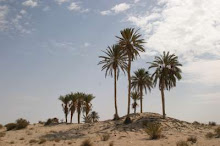Holy Man Sidi Ghazi, who died about 1450 and was buried in Sidi Khrebeesh cemetery, gave his name to the city we now know as Benghazi. The City was originally called as Bani Ghazi –meaning Ghazi’s sons or descendants.
The early immigrants coming from western Libya, who integrated with the local population and with their help, together founded Benghazi on the ruins of the Greek-Roman Berenice برنيقى . Benghazi depended in her early days on the Salt Trade تجارة الملح which was the pillar of her economy, and Benghazi had seven salt lakes.
Writer Dr.Wahbi Ahmed Al Bouri وهبى أحمد البورى , in his book “Benghazi During the Italian Occupation” stated that Benghazi was distinguished from other Libyan cities by the fact that her inhabitants were immigrants from several villages, cities, districts and tribes of Libya that formed a harmonious society adopted to the norms and traditions of both Bedouin and city people البدو و الحضر , and finally transformed into a society with its own character and style that deferred from any other community in Libya.
Benghazi, writer Dr. W. Al Bouri وهبى البورى added, was known for her generosity and sheltering of strangers and the needy persons and opened her arms to take all that wanted to belong to her. This makes the loyalty of Benghazi inhabitants directed towards Benghazi city and not to their original tribes and origins.
In the late nineteenth century Benghazi welcomed several immigrants from Jerba, Sfax, Egypt in addition to Jews, Turks, Armenians and immigrants from Crete that already were there.
One hundred years ago, French explorer M. de Mathuisieux, estimated Benghazi population at thirty thousands including Arabs, Africans, Jews and other communities. In the last census of the year 2004, Benghazi population reached over half a million.
The early immigrants coming from western Libya, who integrated with the local population and with their help, together founded Benghazi on the ruins of the Greek-Roman Berenice برنيقى . Benghazi depended in her early days on the Salt Trade تجارة الملح which was the pillar of her economy, and Benghazi had seven salt lakes.
Writer Dr.Wahbi Ahmed Al Bouri وهبى أحمد البورى , in his book “Benghazi During the Italian Occupation” stated that Benghazi was distinguished from other Libyan cities by the fact that her inhabitants were immigrants from several villages, cities, districts and tribes of Libya that formed a harmonious society adopted to the norms and traditions of both Bedouin and city people البدو و الحضر , and finally transformed into a society with its own character and style that deferred from any other community in Libya.
Benghazi, writer Dr. W. Al Bouri وهبى البورى added, was known for her generosity and sheltering of strangers and the needy persons and opened her arms to take all that wanted to belong to her. This makes the loyalty of Benghazi inhabitants directed towards Benghazi city and not to their original tribes and origins.
In the late nineteenth century Benghazi welcomed several immigrants from Jerba, Sfax, Egypt in addition to Jews, Turks, Armenians and immigrants from Crete that already were there.
One hundred years ago, French explorer M. de Mathuisieux, estimated Benghazi population at thirty thousands including Arabs, Africans, Jews and other communities. In the last census of the year 2004, Benghazi population reached over half a million.
 Unfortunately, the world changes and with it everything changes. I am sure that this Benghazi of old has changed, however few of her original inhabitants still keep the old beautiful spirit alive.
Unfortunately, the world changes and with it everything changes. I am sure that this Benghazi of old has changed, however few of her original inhabitants still keep the old beautiful spirit alive.One of those is the Poet Badria Al Ash hab الشاعرة بدرية الاشهب , Benghazi girl of the fifties, educator and distinguished poet of Spoken Arabic العربية المحكية as we see below in her poem of BENGHAZI:
بنغازي عزوز موشمه ايديها
من كفها تطلع الشمس
في كفها الثاني إطيح
مابينهن تغزل الشمس
أيـامنـا وأحلامنـا
مابينهن تسكن الريح
بنغازي عزور لابسة " رقعة "
بيها إحتمى ليل الشتا وصقعـة
خيوط رقعتها أزقتنا وحوارينا
خيوط رقعتها
شراييـن الحيـاة فينـا
صوت خطوتها ونـس
من غير ما نحكي تحس
من غير مانحتاج للتلميح
بنغازي عزوز لابسة " جربي "
صوف جردها مغزول من قلبي
في جردها يخفي الزمان حكايته
ومن جردها يولد التاريخ
من جردها يفوح البخور
غير عشقها محظـور
لوصفقت لحظة طرب
تنزع ثياب الليل وتفجر النور
لو صفقت لحظـة غضـب
شمس الضحا ما ادور
لو يوم قالت آه
من كثر التعب
كل القلـوب تصيـح
من كفها تطلع الشمس
في كفها الثاني اطيح
مابينهن .. تغزل الشمس أيامنا وأحلامنا
ومابينهن تسجد الريح
من كفها تطلع الشمس
في كفها الثاني إطيح
مابينهن تغزل الشمس
أيـامنـا وأحلامنـا
مابينهن تسكن الريح
بنغازي عزور لابسة " رقعة "
بيها إحتمى ليل الشتا وصقعـة
خيوط رقعتها أزقتنا وحوارينا
خيوط رقعتها
شراييـن الحيـاة فينـا
صوت خطوتها ونـس
من غير ما نحكي تحس
من غير مانحتاج للتلميح
بنغازي عزوز لابسة " جربي "
صوف جردها مغزول من قلبي
في جردها يخفي الزمان حكايته
ومن جردها يولد التاريخ
من جردها يفوح البخور
غير عشقها محظـور
لوصفقت لحظة طرب
تنزع ثياب الليل وتفجر النور
لو صفقت لحظـة غضـب
شمس الضحا ما ادور
لو يوم قالت آه
من كثر التعب
كل القلـوب تصيـح
من كفها تطلع الشمس
في كفها الثاني اطيح
مابينهن .. تغزل الشمس أيامنا وأحلامنا
ومابينهن تسجد الريح


2 comments:
what a beautiful poem about Benghazi, the city of my birth.
thank you for the fantastic information.
Post a Comment